10 Ways To Maximize Your Walking Workout for Faster Weight Loss
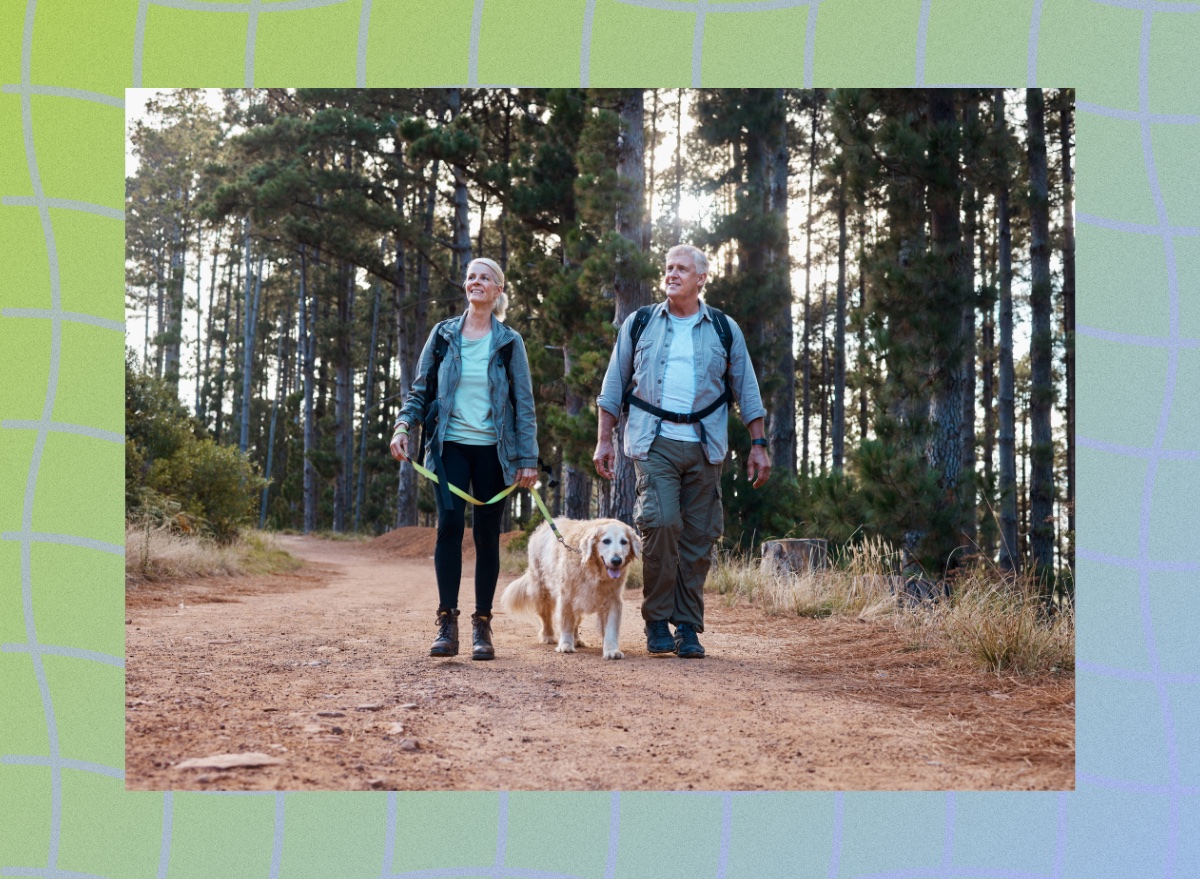
Let’s be honest: Sometimes, getting in your daily steps is the last thing you want to do. But if you can manage to lace up your walking shoes and get your butt out the door, walking can be a surefire way to boost your fitness, torch calories, and speed up weight loss. That’s why we chatted with health and fitness experts who reveal 10 effective yet dead-simple ways to maximize your walking workout for weight loss.
Consistency is key when it comes to walking for weight loss. While the Physical Guidelines for Americans recommends getting at least 150 minutes of moderate-intensity aerobic exercise (e.g., walking) per week for good health, walking without switching up your routine can lead to fitness plateaus where your fitness stops progressing and weight loss comes to a screeching halt. Fortunately, whether you’re just starting your fitness journey or looking to take your current routine to the next level, incorporating these tips can help you reap the most benefits of your walking workouts.
Read on for our list of 10 ways to maximize your walking workout for weight loss and help you reach your fitness goals faster. And when you’re done, don’t miss The #1 Best Fitness Habit for Weight Loss, According to a Trainer.
Incorporate rucking.
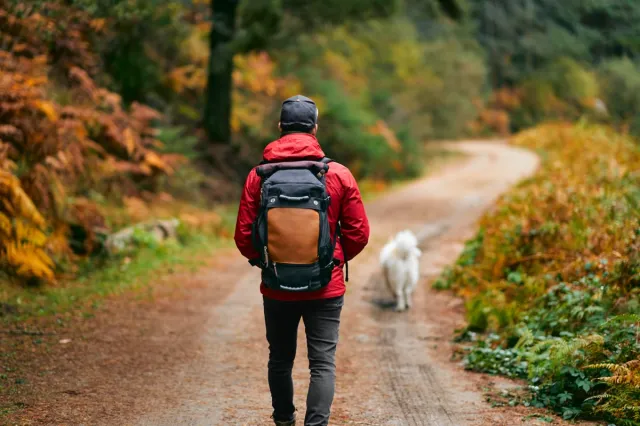
Rucking involves walking with a weighted backpack, which can add intensity to your workout and help burn more calories.
“Rucking is essentially walking with a weighted backpack, which adds resistance and engages more muscles, leading to an increase in calorie burn and muscle activation,” explains Tracie Haines-Landram, CSCS, a certified strength and conditioning specialist and nutrition coach with Barbend. “Increased calorie burn creates more of a calorie deficit needed for weight loss. Plus, rucking helps build strength and muscle mass, which can lead to a higher metabolism at rest.”
Race against yourself.
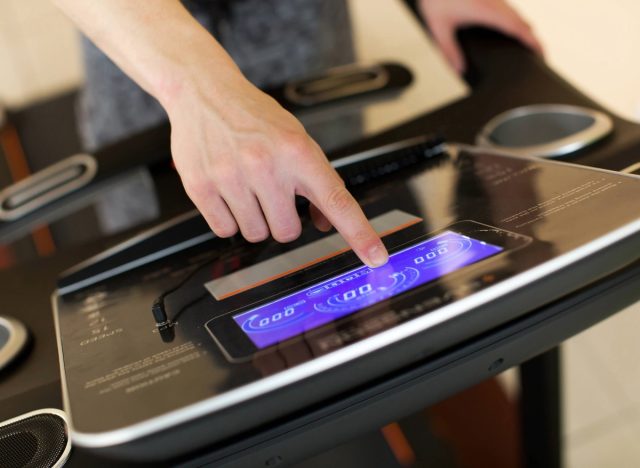
For those with a competitive streak, challenging yourself to improve your walking speed or distance over time can help you stay on track with your fitness goals.
“The faster you walk, the more calories you’ll burn per minute of exercise,” says TJ Mentus, CPT, a certified personal trainer at Garage Gym Reviews. “Start at your normal walking pace and gradually increase over time. A good way to do this would be to find a distance you’re comfortable with and time how long it takes to walk. Try to beat that time during your next workout by walking a little faster. Continue this until you can’t increase the speed of walking anymore.”
Add inclines.
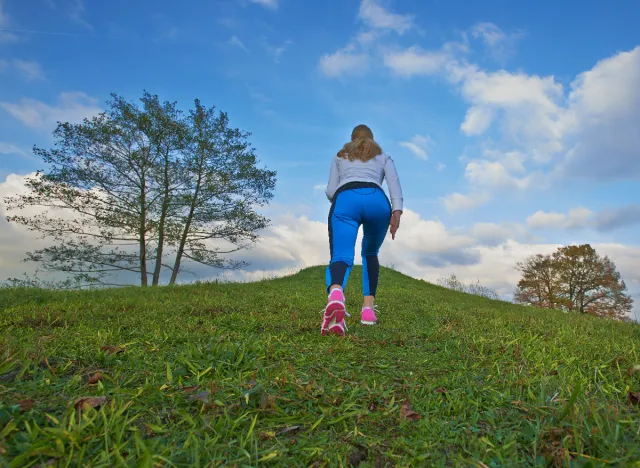
According to a 2022 study, walking on a 6% slope for at least 30 minutes resulted in more fat loss for women in their 50s than regular walking.
“Walking uphill engages more muscles, increases your heart rate, and burns more calories than walking on a flat surface,” says Haines-Landram. “On a treadmill, you can add uphill walking by adjusting the incline button, which is usually displayed as a percentage grade. You can keep the same incline over the whole duration or add intervals of incline, where you are alternating between flat and incline walking.”
Use intervals.
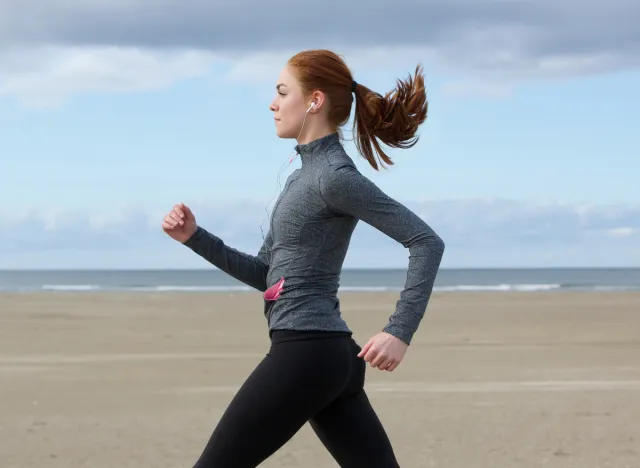
Interval training is a fantastic way to enhance your cardiovascular fitness and help you break through weight-loss plateaus.
Mentus explains, “Intervals are a way of varying intensities that can help you to burn more calories throughout the workout. This can be done by walking either at varying speeds or inclines. If you were going to walk for 30 minutes, you could alternate between four minutes at a moderate pace or no incline and then one minute at a fast pace or incline for six rounds.”
Get outdoors.
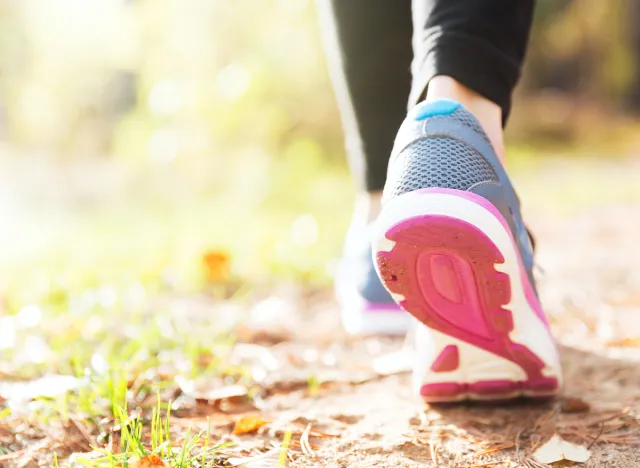
Let’s be honest: Walking can get pretty mundane. Fortunately, walking outdoors can provide a change of scenery and terrain to keep your walks interesting and help you stay motivated. Studies also show that walking outdoors can help manage stress, lower cholesterol, and reduce blood pressure.
“Walking outdoors expends more energy, therefore calorie burn is higher. More muscle activation is needed to propel yourself forward outdoors without having the motorized treadmill to keep you going. Additionally, other factors can make it more challenging and calorie burning, such as wind resistance, uneven terrain, and incline changes,” says Haines-Landram.
Walk first thing in the morning.

Walking in the morning can kickstart your metabolism and set a positive tone for the day ahead. A 2020 review found that sticking to a consistent exercise time—especially in the morning—can boost exercise adherence, which in turn can support your weight-loss efforts.
“Starting the day with a walk has many benefits. The main thing it does is make it easier to be consistent and stick to your routine. You can get your walk done before any other responsibilities arise. However, if you wait until later in the day, something else that needs your attention may come up. Walking on an empty stomach can also help improve fat burning. Try to get out the door as quickly as possible after waking up to avoid talking yourself out of it.”
Take it to the trails.
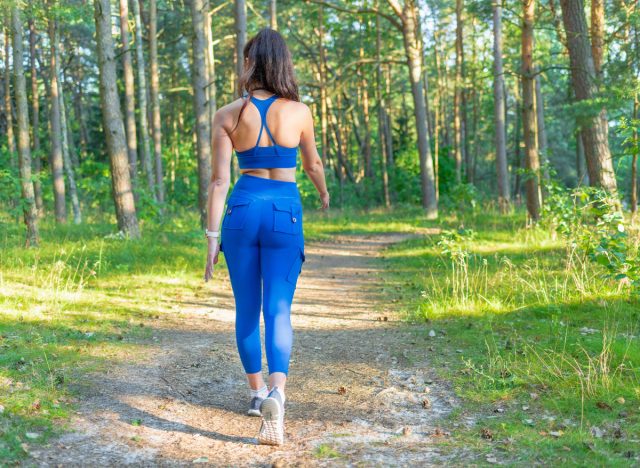
Walking on hiking trails can enhance your workouts and speed up weight loss by providing a more challenging terrain and variation between inclines and declines. According to a 2021 study, hiking can reduce inflammation, lower triglycerides, and support healthy weight management.
“Whether it is a well-kept walking trail at the park or an unpredictable path in the woods, hiking offers a combination of cardiovascular exercise, muscle engagement, and outdoor adventure,” states Haines-Landram. “Hiking is an opportunity to increase workout intensity, boost calorie expenditure, and a perfect time to add a weighted backpack for rucking.”
Walk with others.
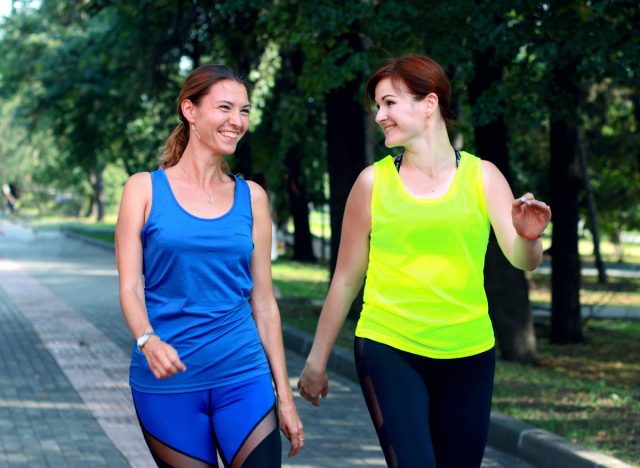
Walking with a friend or in a group can make your walks way more enjoyable and help you stay motivated. Plus, research suggests that group exercise can better support long-term weight loss than going solo.
“Going on a walk with others helps to hold you accountable and increases long-term weight loss success,” says Mentus. “When you’re alone, it can be easier to cut a walk short or skip it altogether. But with others, it will make the time go by faster and harder to say no to.”
Increase your N.E.A.T.

Sustainable weight loss requires more than burning calories during exercise. Enter Non-exercise activity thermogenesis (N.E.A.T.)—all the calories you burn during daily activities beyond exercise, like cleaning, gardening, or even fidgeting. Increasing your N.E.A.T. can complement your walking routine and aid in weight loss.
Haines-Landram says, “While walking can be a workout, adding multiple short bouts of walking or light activity throughout the day can increase calorie expenditure and result in faster weight loss. Examples include taking the stairs instead of the elevator, having a walking meeting, doing house chores, yard work, and walking your dog around the block.”
Engage the mind-muscle connection.

Paying attention to your body’s movements is an excellent strategy for staying focused, preventing injuries, and improving your fitness.
“It’s easy to walk and not give much thought to what you’re doing or what muscles you’re even using,” says Mentus. “However, engaging the mind-muscle connection while walking can help your muscles work harder and burn more energy during your workout. As you walk, think about using the glutes to pull the ground behind you as you move forward.”
- Source: Effects of gradient and age on energy expenditure and fat metabolism during aerobic exercise at equal intensity in women
- Source: The health benefits of the great outdoors: A systematic review and meta-analysis of greenspace exposure and health outcomes
- Source: Downhill hiking improves low-grade inflammation, triglycerides, body weight and glucose tolerance
- Source: Are individual or group interventions more effective for long‐term weight loss in adults with obesity? A systematic review









